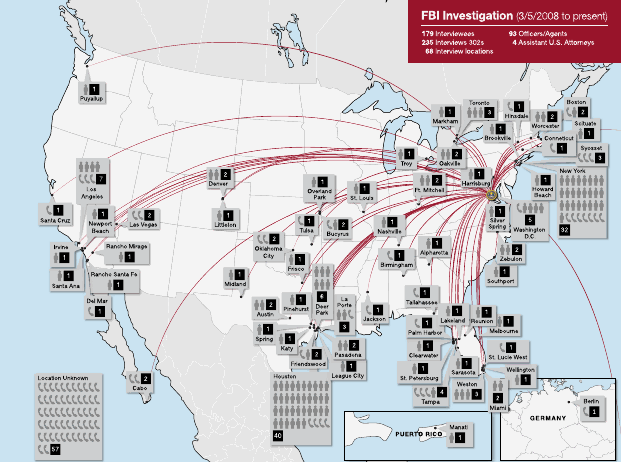DOJ Gives Blackwater a Whitewash On Felony Charges
 Something funny happened in the Eastern District of North Carolina today. Out of the blue in an extremely significant case, and without particular notice to interested observers, much less the public, the criminal case against former Blackwater executives for weapons trafficking, and a myriad of other weapons violations, ended. Poof! Gone with an undeserved and inexplicable sweetheart misdemeanor plea.
Something funny happened in the Eastern District of North Carolina today. Out of the blue in an extremely significant case, and without particular notice to interested observers, much less the public, the criminal case against former Blackwater executives for weapons trafficking, and a myriad of other weapons violations, ended. Poof! Gone with an undeserved and inexplicable sweetheart misdemeanor plea.
From local Raleigh outlet WRAL:
A federal weapons case against the defense contractor formerly known as Blackwater Worldwide ended Thursday with misdemeanor pleas by two former executives, who were fined and placed on probation.
The case stems in part from a raid conducted by federal agents at the company’s Moyock headquarters in 2008 that seized 22 weapons, including 17 AK-47s. An indictment alleged that the company used the Camden County Sheriff’s Office to pose as the purchaser of dozens of automatic weapons.
The indictment also alleged that Blackwater purchased 227 short barrels and installed them on long rifles without registering them and that company officials presented the king of Jordan with five guns as gifts in hopes of landing a lucrative overseas contract and then falsified federal documents once they realized they were unable to account for the weapons.
Gary Jackson and William Matthews, the former president and executive vice president of the company and both Navy Seals, pleaded guilty Thursday to one count each of failure to keep records on firearms. They were sentenced to four months of house arrest, three years on probation and fined $5,000.
The original indictment was fifteen counts, count em 15 counts, most all serious felonies with significant punishment in the offing. Now granted, a few counts were pared off after a motion to dismiss by a court order dated February 4, 2013, but significant and substantive counts remained viable against Blackwater executives Jackson and Matthews.
But, instead of taking them to trial, or even extracting a reasonable plea that did justice for the public, the DOJ collaborated with the defense and walked into court without notice today, filed a new information containing a single misdemeanor charge and proceeded to sentence them on the spot to a hand slap.
Here is how the official DOJ Press Release described it:
United States Attorney Thomas G. Walker announced that in federal court today GARY JACKSON and WILLIAM WHEELER MATTHEWS, JR. pled guilty before United States District Judge Louise W. Flanagan, to one count each of failing to make and maintain records related to firearms in violation of Title 18, United States Code, Sections 922(m) and 923(g)(1)(A).
Additionally, Judge Flanagan sentenced JACKSON and MATTHEWS to 3 years probation, 4 months house arrest with stipulations, and fined them $5,000.00.
According to the Criminal Information filed on February 14, 2013, JACKSON and MATTHEWS, between 2005 and 2007, were employees of a corporate entity formerly known as Blackwater which was a licensed federal firearms manufacturer and dealer, and whose responsibilities for a certain period of time included direct or indirect supervisory authority over employees whose duties included the making and maintenance of records required by federal law. (Emphasis added)
Oh yeah, there was one other mention of note in the release:
The corporate entity formerly known as Blackwater has entered into a Deferred Prosecution Agreement with the government in which it has agreed to extensive ongoing compliance programs and the payment of approximately 7 million dollars in fines.
How nice. The Deferred Prosecution Agreement was actually entered into and noticed back in August of last year. It was easy to see the DPA coming, and as much as the US Government relies on Blackwater/Xe/Academi for their security adventures, it was predictable they would be given a DPA (and, hey, DPAs provide lucrative paydays to former DOJ friends who get set up in cushy monitor jobs).
The DPA was easy to see coming, today’s sweetheart plea was not. No, it happened basically as a covert op on the public and interested legal community. Did you notice the bolded date in the DOJ press release? DOJ states the plea was entered on February 14, 2013. What is interesting is that it was not placed on the official court docket until today – at the same time Judge Louise Flanagan, a conservative Bush appointee, was accepting the plea and sentencing Jackson and Matthews, thus ending the case. All designed so the public would not know and could not have any input. Diametrically contrary to the fundamental precepts of the American justice system.
How little of a wrist slap is the sentence? I’ve had common DWI clients sentenced to more. Compare and contrast to the punishment the DOJ sought to impose on Aaron Swartz.
The sentence is now done and entered, but what about the process? It was a stunning affront to justice and the public right to know. I have complained relentlessly about the collusion between the DOJ and another Bush era criminal, former Office of Special counsel Chief Scott Bloch. But at least in Bloch there was minimal notice given to the public and we knew what was coming, in spite of inexplicable collusion between the DOJ and the criminal defendant. Not so in the case of these Blackwater executives, Jackson, Matthews, et al.
Even in Bloch, in spite of complete collusion on the part of the DOJ, the court set sentencing for nearly three months after the entry of the plea. Not so with Judge Flanagan and the Blackwater boys. How unusual is it that a Federal court sentences criminal defendants immediately in high profile important cases with important implications like this? VERY UNUSUAL.
In fact it is simply stunning, all the more so considering that the parties and the court hid the fact the plea was entered from the public and the court docket system in the period between the entrance of plea on February 14 and the plea acceptance and immediate sentencing today.
To give you an idea of how out of the ordinary such a sentencing on the spot is, there are directly applicable provisions in the Federal Rules of Criminal Procedure that must be specifically obviated on the record to even attempt it. Rule 32(c) provides:
(c) Presentence Investigation.
(1) Required Investigation.
(A) In General. The probation officer must conduct a presentence investigation and submit a report to the court before it imposes sentence unless:
(i) 18 U.S.C. §3593 (c) or another statute requires otherwise; or
(ii) the court finds that the information in the record enables it to meaningfully exercise its sentencing authority under 18 U.S.C. §3553, and the court explains its finding on the record.
(B) Restitution. If the law permits restitution, the probation officer must conduct an investigation and submit a report that contains sufficient information for the court to order restitution.
18 USC 3593 concerns death penalty cases, so the ONLY way Jackson and Matthews could have been sentenced today is for the court to have made a specific finding, based upon information on and in the record, and then stated the specific reasons for the decision, and evidence supporting it, all on the record.
Did Judge Flanagan do that? Well, we do not know because there is no sentencing minute entry on the docket as there normally is. It just isn’t there. What’s more, we cannot know if there was a stipulation to hide the plea entry and immediate sentencing plans in the plea agreement (docket number 364), because the plea agreement is SEALED.
All ability of the public to know this was coming, and to discern what really happened, has been secreted from the public. Secret justice (or, more properly, injustice).
How and why did all this occur? Undoubtedly because of the highly classified and incestuous relationship between Blackwater and the US Government, and the resulting ability of Blackwater to literally blackmail and extort concessions through graymail threats (See here for a short history of graymail).
So, through secrecy, classification, graymail and direct collusion with the DOJ, Blackwater, and its executive henchmen, win and the American public lose yet again. I have been practicing criminal law for 25 years and I am absolutely offended by what occurred in Judge Louise Flanagan’s courtroom today. Both she and the Obama Department of Justice should be made to answer for it.
[UPDATE: It appears the plea agreement itself is not completely sealed, it is just kept “unavailable” from the public docket. Upon information and belief, it can be viewed if you personally go to the clerk’s office for the Eastern District of North Carolina and ask to see it. The other items described in the post as missing from the docket entirely remain so missing.]







